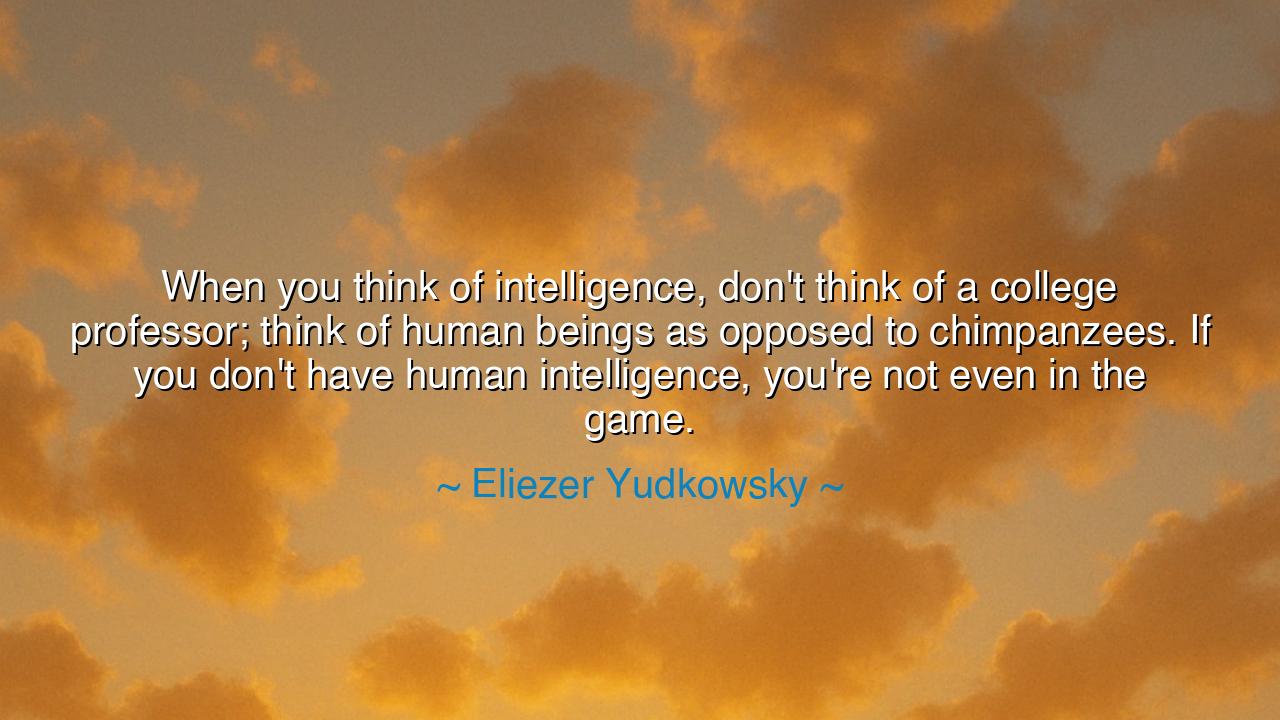
When you think of intelligence, don't think of a college
When you think of intelligence, don't think of a college professor; think of human beings as opposed to chimpanzees. If you don't have human intelligence, you're not even in the game.






Hear now, seekers of wisdom and clarity, the words of Eliezer Yudkowsky, a thinker of our age who peers deeply into the essence of mind and progress: “When you think of intelligence, don't think of a college professor; think of human beings as opposed to chimpanzees. If you don't have human intelligence, you're not even in the game.” Within this saying lies not a slight against learning, but a revelation about what intelligence truly means — the primal spark that separates one species from another, the creative flame that lifts the mortal toward mastery over the world.
Since the dawn of time, the line between the thinking creature and the unthinking one has marked the boundary of destiny. When the first human shaped a tool from stone, he did not merely act — he thought ahead. When he drew fire from the heavens, he transformed survival into civilization. Thus, Yudkowsky’s insight reminds us that intelligence is not merely the capacity to remember or recite; it is the power to transform, to foresee, to invent. The college professor may embody learned knowledge, but true intelligence — the kind that defines humanity — is the force that builds the very world in which such professors exist.
This distinction echoes throughout the story of humankind. Consider Leonardo da Vinci, whose mind bridged the realms of art and science. His genius did not arise from titles or institutions, but from an insatiable curiosity, a hunger to understand and create. His was not intelligence confined to a subject, but intelligence expansive, reflective, divine — akin to that spark which distinguishes humans from chimpanzees. Da Vinci’s mind, unbound and generative, exemplifies Yudkowsky’s teaching: that true intelligence lies not in learning what is known, but in imagining what is possible.
Yet, Yudkowsky’s words carry another layer of warning, especially in our modern age. When he speaks of intelligence “as opposed to chimpanzees,” he speaks of thresholds — of being “in the game.” Just as humanity’s rise depended on surpassing the limitations of instinct and environment, so too does our future hinge on preserving and advancing the essence of intelligence itself. In the realms of artificial intelligence, biology, and ethics, the question is not whether machines can mimic intellect, but whether they can embody that same transformative awareness that lifted humanity above nature’s chains.
From this insight arises humility. Intelligence is not merely possession of knowledge, but the foundation of agency itself — the ability to understand purpose and consequence. Without it, one is like a creature in the forest, reacting but not directing, existing but not shaping. The great civilizations, the discoveries, the works of art that endure — all are manifestations of this higher intelligence, born not from rote learning but from the deep integration of thought, intuition, and imagination.
Consider also the example of Albert Einstein, who defied the conventions of academia. As a young patent clerk, he contemplated the nature of time and light with the wonder of a dreamer and the precision of a mathematician. His revelations did not emerge from authority or title, but from the essence of human intelligence — the power to ask “why,” and the courage to follow the answer beyond accepted boundaries. This is the intelligence Yudkowsky calls us to recognize: not institutional, but evolutionary; not academic, but creative and self-aware.
The lesson for all who hear is this: cultivate intelligence as a living force, not as a collection of facts. Do not mistake education for enlightenment, nor cleverness for wisdom. True intelligence is the mind’s ability to envision the unseen, to connect disparate truths, to act with both curiosity and conscience. It is the light that guides invention, but also the mirror that reveals meaning. To lack this light is, as Yudkowsky warns, to be “not even in the game” — to drift through existence without direction or comprehension of one’s potential.
Finally, remember that the measure of intelligence is not found in comparison, but in creation. The human mind, when awakened, possesses the capacity to reshape the world and uplift generations. Cultivate it. Question deeply, imagine boldly, and act wisely. For intelligence is not a title or a test; it is the sacred power of awareness — the very spark that makes you more than instinct, more than survival, more than the beast. It is, in the end, the divine inheritance of humanity, the eternal game in which thought itself is both the player and the prize.






AAdministratorAdministrator
Welcome, honored guests. Please leave a comment, we will respond soon